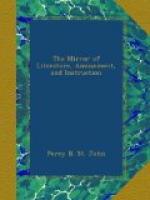BY THE AUTHOR OF THE HUNCHBACK.
You’ve changed the seal—you’ve
changed it thrice:
Your first implied you loved:
How welcome was the dear device,
A thousand kisses proved.
Your next was love—it spoke
the flame,
Yet scarce so plain methought—
I kiss’d it, wishing it the same
Your first sweet letter brought
The second change, was change indeed—
To friendship—Judge
my bliss—
And did I kiss that seal—I
did—
But ’twas a farewell
kiss.
The third—nor love, nor friendship—There
Indeed love’s dream
should end—
As coldest stranger better far
Than lover turn’d to
friend.
No kiss I gave that seal—no
name—
Still dear—of thine
it bore—
The signet, whence the impress came,
Perhaps a rival wore.
I smil’d to think ’twas so—’twas
strange—
And have such cause to sigh—
How couldst thou—fairest creature—change?
O, wherefore could not I.
Monthly Mag.
* * * * *
By a Parliamentary return it appears, that Kensington Palace cost the public in 1828, 2,412_l_. 8_s_. 11_d_.; in 1829, 4,638_l_. 8_s_.; in 1830, 6,203_l_. 5_s_. 11_d_.; and in 183l, 3,921_l_. 15_s_. Hampton Court in 1828, cost 4,430_l_. 19_s_. 5_d_.; in 1829, 5,964_l_. 13_s_. 1_d_.; in 1830, 4,144_l_. 2_s_. 4_d_.; and in 183l, 3,994_l_. 15_s_. 11_d_.—Times.
* * * * *
THE GATHERER.
* * * * *
Dr. Johnson has remarked that the French are fond of Young’s Night Thoughts, a fact which is hard to be accounted for, that a nation so celebrated for their gaiety should have a regard for an author treating on such serious subjects.
Wigs.—In the reign of Queen Anne, enormous full-bottomed wigs often cost twenty or thirty guineas each.
“Capillary Attraction.”—When Charles II. was espoused to the Infanta of Portugal, a fleet was sent over to Lisbon, with proper attendants to bring her hither, but her majesty being informed that there were some particular customs in Portugal, with relation to the ladies, which the king would not easily dispense with, the fleet was detained six or seven weeks, at a great expense, till her majesty’s hair grew.
(Mr. Prince, with his Russia Oil, would have prospered under Royal Patronage in those days; and Mr. Rowland would not have needed immortality in Byron’s verse: “incomparable huile Macassar.”)




